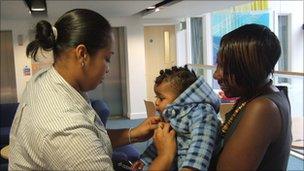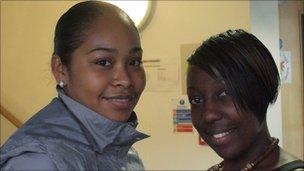Family nurses offer young mothers a bright future
- Published
Chancellor George Osborne says he will refocus public spending on schemes that make a difference to long-term economic success. One such scheme is the Family Nurse Partnership - but can it survive the cuts?
Georgina and Jermaine have a lot on their plates. Georgina, 18, is 14 weeks pregnant and the father, Jermaine, 20, does not have a job and is not in education.
But they say they are positive about their future and, with encouragement from the weekly visits of their family nurse, they have started to think more long-term.
"The stuff that she asks us about makes us think about things more. Things you would not have thought about like: 'Where do you see yourself in three years?'"
Georgina's age and the fact this is her first baby qualify her for a place on the Family Nurse Partnership programme in Lambeth, London. The scheme is being piloted in more than 50 local authorities around England.

Family nurse Caroline (r) has helped young mother Michaeli gain confidence with her son Zephaniah
Women under the age of 20 who are pregnant with their first child are allocated a family nurse, who visits the mother and her partner at least every two weeks from the fifth month of pregnancy until the baby is two years old.
The nurse provides practical guidance on staying healthy in pregnancy, what happens in labour and how to care for a new baby, as well as career and childcare advice and emotional support.
Michaeli, 20, whose son Zephaniah is 10 months old, is on the scheme. She says without her family nurse Caroline she would have struggled.
"I was just clueless. I asked her about everything - feeding him, clothing him, what to buy, what to do, breastfeeding. Me and my mum do get along but there are some questions I would not go to her with."
'Bright future'
Michaeli says Caroline has also helped her get a place at college for September and find a nursery for Zephaniah.
"I think my future is bright. My son has not stopped me. My aim is still there and I am going to fulfil that for him. He is my inspiration."
Liz Currie has worked as a family nurse in Lambeth, London for 18 months. She says a lot of young mothers live in hostels or with extended family who do not care for them.
"It is a different form of conversation we have with our teenagers. I think if you tell a young person what to do the shutters will go up and they probably won't want to see you again. But because of this intensive home visiting, they develop a trust.
"You are leaving the thought with them. They explore it and the next time you go back, they say, 'yeah, I have only had 30 cigarettes today instead of 40.' That is a huge step for some of these girls who are smoking excessively.
"That is not being flippant, that is the truth."
The Family Nurse Partnership started in the United States more than 30 years ago and researchers have monitored the progress of the families who were on the programme at the start.
The results show that the mothers had better pre-natal health, fewer subsequent pregnancies and increased employment.
The children went on to perform better at school and were less likely to get involved in youth crime. They suffered fewer childhood accidents and fewer mental health problems.

The Family Nurse Partnership tries to allow women to think differently about their place in the world
Kate Billingham, project director of the Family Nurse Partnership, said early findings from the pilot are promising.
"Early intervention moves public services away from seeing people as a problem, a risk and a deficit to engaging with them around their potential and realising their strengths.
"The difficulty often for very young and vulnerable mothers is that their previous relationships have left them very defensive.
"But because of the way the programme works they seem to trust family nurses in a way they have never trusted anybody before."
The coalition government has announced a cross-party review of early intervention, which will report back in January 2011.
Last week, Children's Minister Sarah Teather told The World Tonight the government is committed to early intervention and the upfront investment required.
But there was considerable commitment to early intervention from New Labour when they first came to power, which did not come to fruition.
Sonia Sodha, head of the Public Finance Programme at the Demos thinktank said the problem was not only one of central government funding.
The fact that the benefits will only be seen 15 or 20 years down the line, and might not benefit the service that made the original investment, could prove problematic.
In this respect, the Family Nurse Partnership could share the same fate as New Labour's early years education scheme Sure Start.
"Sure Start was originally modelled on US schemes - those very structured programmes like Incredible Years." says Sonia Sodha.
"But Sure Start centres became more of an infrastructure like a school rather than a device for implementing effective early intervention.
"That is of incredible value, but the results are quite frankly moderate - some would say mediocre - compared to what could have been achieved were Sure Start used to deliver properly targeted, evidence-based programmes."
Hear more in a series of reports on early intervention schemes on The World Tonight, Radio 4, 2200 BST weekdays, or listen again on the BBC iPlayer.
- Published17 August 2010
- Published17 August 2010